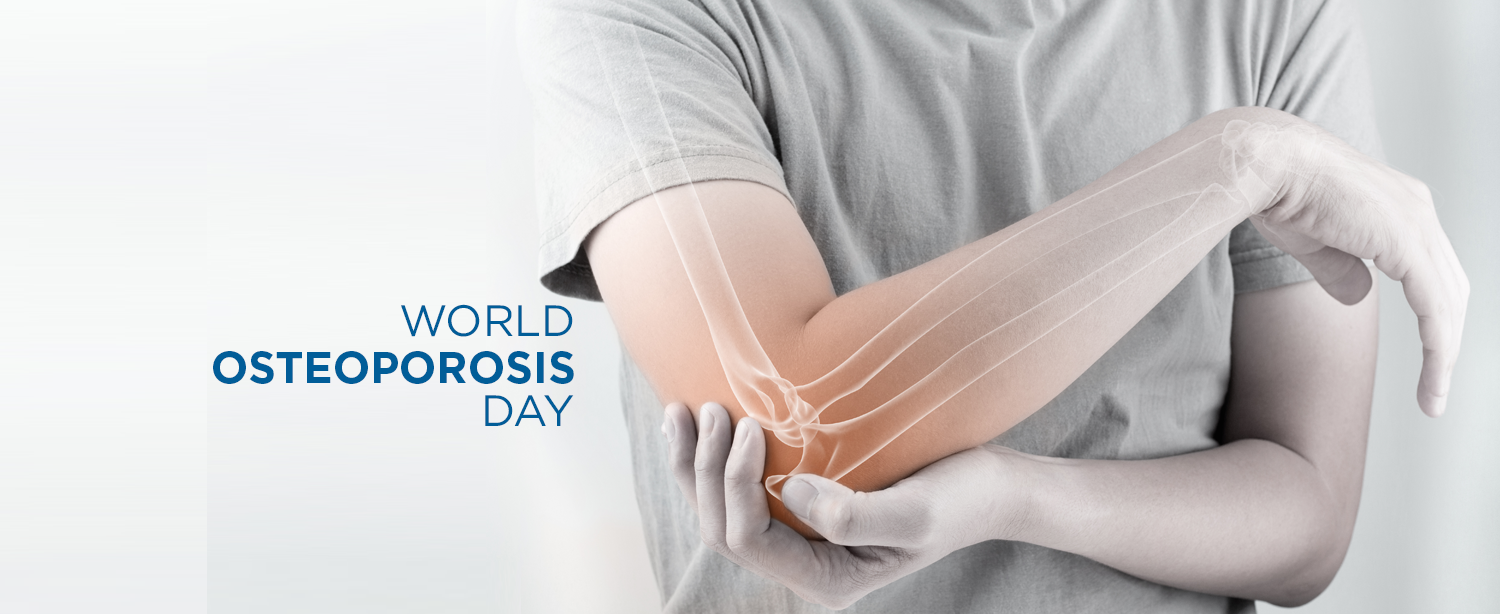Osteoporosis is a bone disease that occurs when the body loses too much bone, makes too little bone, or both. As a result, bones become weak and may break from a fall or even by minor bumps. Osteoporosis means porous bones. Osteoporotic bones have lost density or mass and contain abnormal tissue structure. As bones become less dense, they weaken and are more likely to break. World Osteoporosis Day, 20th October is dedicated to raising global awareness of the prevention, diagnosis and treatment of osteoporosis.
Fracture, the most common early symptom:
You may have a fragility-related fracture before you are diagnosed with bone loss or osteoporosis. This means that your wrist, back, hip, or another bone is fractured as a result of a mild to moderate trauma, such as falling from below your standing height. Mild impact caused by tripping, falling, or hitting an object that might not have fractured or broken a bone in previous years can cause future fractures when you develop bone loss or osteoporosis.
Other early signs of Osteoporosis:
- A loss of height or change in posture, such as stooping over, can be signs that you might have osteoporosis.
- If you have a height loss of more than two inches or you have curvature of the spine, ask your doctor.
- High levels of serum calcium or alkaline phosphatase on a blood test
- Bone mineral density results showing a T-score of -2.5 or less.
- Vitamin D deficiency.
- Difficulty getting up from a chair without using your arms to push.
- Joint or muscle aches.
Who should get screened?
Men and women older than 50 should talk to their doctor about Osteoporosis. Any adult who has had a fracture after age 50 needs to get their bone density checked. Bone loss begins without noticeable symptoms hence screening is required.
How to reduce your risk of osteoporosis:
- Exercise regularly: Exercise, particularly weight-bearing exercises like walking, is important for good bone health. Balance training can also help prevent falls which is a leading cause of fractures. People who already have osteoporosis should avoid forward-bending of the spine, or exercises that involve twisting or jerking of the spine, and should consult with a physical therapist regarding appropriate exercises.
- Smoking: Smoking is a risk factor for osteoporosis, and quitting is necessary for overall good health, including bone health.
- Limit alcohol consumption: Consuming alcohol is another risk factor for osteoporosis, so limiting alcohol consumption is important.
- Calcium supplements: From the age of 40, through menopause and into old age, women should also consider taking calcium supplements on a regular basis to keep their bones strong and elastic to prevent fractures.
- Concentrate on Vitamin K: Kale, spinach, collards, chard, turnip greens, and other dark leafy greens are rich in vitamin K. Vitamin K improves bone health and helps slow down bone loss after menopause in women.
Osteoporosis, are you at risk:
- Age. Your bone density peaks around age 30. After that, you’ll begin to lose bone mass. So that’s all the more reason to do strength training and weight-bearing exercise — and make sure you get enough calcium and vitamin D from your diet — to keep your bones as strong as possible as you get older.
- Gender. Women over the age of 50 are the most likely people to develop osteoporosis. The condition is 4 times as likely in women than men.
- Family history. If your parents or grandparents have had any signs of osteoporosis, such as a fractured hip after a minor fall, you may be more likely to get it, too.
- Bone structure and body weight. Petite and thin women have a greater chance of developing osteoporosis. One reason is that they have less bone to lose than women with more body weight and larger frames.
- Broken bones. If you’ve had fractures before, your bones may not be as strong.
- Certain diseases. Some diseases such as rheumatoid arthritis raise the odds that you’ll get osteoporosis.
- Some medications. Certain prescription medications taken for long durations can also boost your odds of getting osteoporosis.
- Smoking. It’s bad for your bones. To lower your risk of osteoporosis and fractures — and many other health problems quit smoking.
- Alcohol. Heavy drinking can lead to thinning of the bones and make fractures more likely.
Do you or a family member have any symptoms of Osteoporosis? Get it checked today itself without any delay. Consult our experts at the Osteoporosis Clinic at Kokilaben Dhirubhai Ambani Hospital. Please find below link:
https://www.kokilabenhospital.com/departments/clinicsatkh/osteoporosisclinic.html


